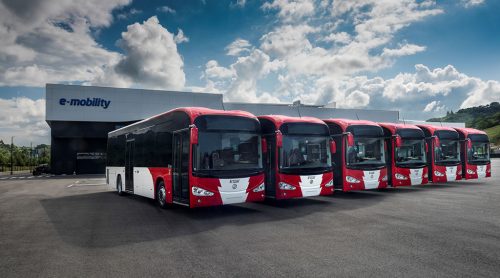Irizar secures important new export business for its zero-emission bus

LUXEMBOURG Minister François Bausch together with the technical services of the Ministry of Transport and Voyages Emile Weber, as well as representatives from Irizar e-mobility, have officially presented the first six ie electric buses of a total of 10 which will be delivered over the course of this year.
These initial six are 12-metre long Irizar ie vehicles with two doors. They are equipped with USB ports and the ‘Eco Assist’ system that assists the driver in real-time with a view to optimising driving, reducing energy consumption and increasing the bus’s range.
The buses will operate on the 290 route which runs between Mersch (Gare) and Luxembourg (Terminus: Badanstalt) from 0520hrs to 2343hrs. They have a range of over 200km, guaranteeing 16 hours of driving in heavy traffic conditions. Charging will take place at night in the new Bissen depot using six chargers with Combo – (CCS2) connectors that have also been supplied by Irizar.
Irizar has decided to establish an after-sales service in the city of Luxembourg, close to the new Bissen depot, which offers personalised R&M packages and is managed by technical experts and locally hired employees, thus helping to create local jobs and prosperity.
The four additional buses to be delivered will be 18m artics. All of the new deliveries are part of the city of Luxembourg’s commitment to sustainability and improving the quality of the city and the quality of life of its citizens.
François Bausch said: “Electric initiative for line 290 is in complete consonance with the government’s policy recommending that, in light of advances in technology, all RGTR (Régime Général des Transports Routiers) buses in Luxembourg be completely zero emissions in 2030.”

